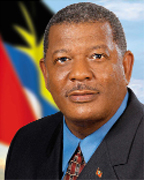The services sector is the future of the Caribbean Community (CARICOM) and governments have the responsibility to provide the enabling environment and other incentives for its development, Antigua and Barbuda Prime Minister Baldwin Spencer said yesterday.

He noted that while agriculture and manufacturing will remain important for the regional economy, for many of the CARICOM member states the services sector is the future.
“Tourism and financial services have been our traditional export services. But the non-traditional sub-sectors provide new opportunities for further services exports within the Region and extra-regionally. We therefore have to make the services sector work for us. . . .,” Spencer said.
Prime Minister Spencer, who is also the lead Head of Government with Respon-sibility for Services in the CARICOM Quasi Cabinet, was at the time delivering the feature address at the opening ceremony of a three-day Regional Symposium on Services at the Grand Royal Antiguan Beach Resort in St. John’s.
The symposium is being held by the CARICOM Secretariat with support from the United Kingdom Department for International Development (DFID), the Spanish Agency for International Cooperation for Development (AECID), and the United Nations Development Programme (UNDP) which were all represented at the forum.
Spencer also called on the private sector to organize itself in a manner similar to the traditional sectors, and complete the process of establishing National Coalitions of Service Providers as soon as possible.
“National Services Coalitions will provide support to their members to better position them to increase their competitiveness and enhance exports of services,” Spencer contended.
And the work to harmonise domestic regulations for a number of service sectors, he added, must also be completed to give the necessary support and confidence to service providers and consumers alike.
The prime minister had earlier highlighted the fact that Caribbean economies were very vulnerable, citing the impact the recession in the world economy has had on the Region.
“The crisis has negatively affected important economic sectors in the Region. The most severely affected are tourism and related services, construction, the financial sector, the oil, alumina and aluminum industries, and public administration,” he noted.
Spencer then argued that member states can practice the highest level of governance, enact and enforce the best regulatory framework and continuously strive to maintain high standards of living for their people but the current environment clearly shows that their economies, way of life and social services as well as governance “are not impervious to external shocks over which we have no control.”
He maintained, however, that, “What we have control over though, is our opportunity to work together as a people to meet these ever present challenges.”





